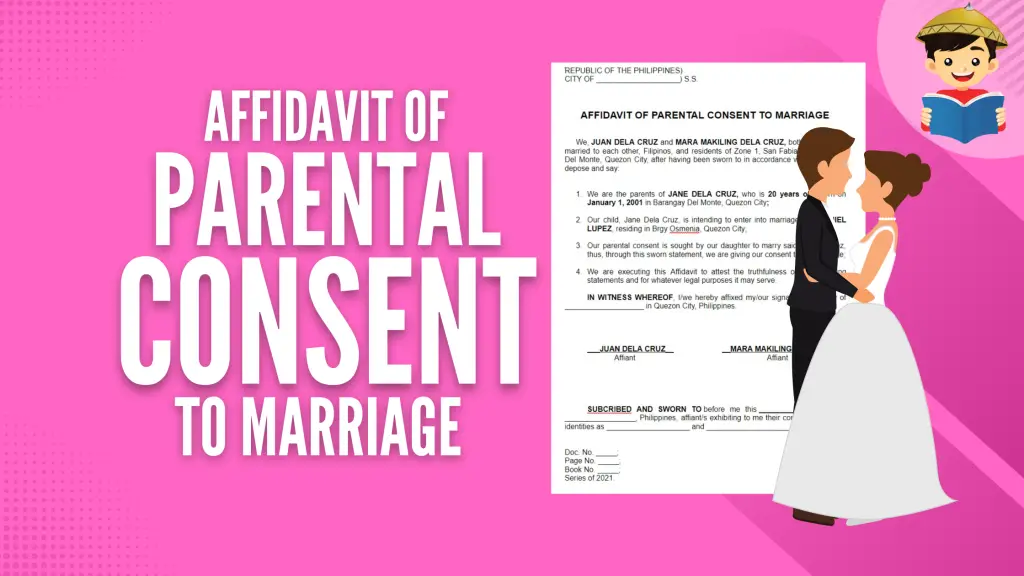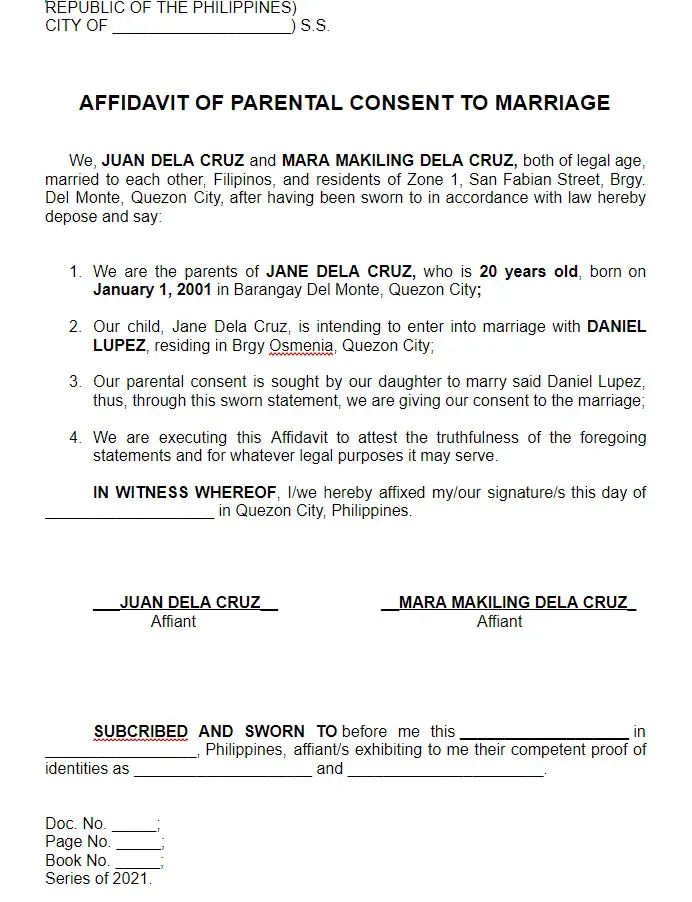How To Get Parental Consent for Marriage in the Philippines (With Free Template)

Getting married young is a milestone that is both exciting and intimidating. This is why young couples must be properly guided by their parents before they take the leap.
Parental consent ensures both parties know what they’re getting into and have the blessing of their parents. Learn more about parental consent for marriage and how to get one through this definitive guide.
DISCLAIMER: This article has been written for general informational purposes only and is not legal advice or a substitute for legal counsel. You should contact your attorney to obtain advice with respect to any particular issue or problem. The use of the information contained herein does not create an attorney-client relationship between the author and the user/reader.
Table of Contents
- Watch Video: How To Get a Marriage License in the Philippines
- What Is Parental Consent for Marriage?
- How To Get Parental Consent for Marriage in the Philippines
- Affidavit of Parental Consent to Marriage Sample Template (Free Download)
- Can I Get Married in the Philippines Without Parental Consent?
- Frequently Asked Questions
- Reference
Watch Video: How To Get a Marriage License in the Philippines
What Is Parental Consent for Marriage?
Parental consent is a document in writing required before issuing a marriage license when either one or both parties to a marriage are between the ages of 18 and 20.
It is signed by the father, mother, surviving parent or guardian, or persons having charge of them, in the order mentioned.
For example, if you are just 20 years old and want to enter into marriage, you must submit parental consent, in addition to other documentary requirements, when applying for a marriage license.
How To Get Parental Consent for Marriage in the Philippines
Parental consent is done in either of the following manners:
- Personal appearance of the interested parties in the local civil registrar of the city or municipality where the contracting parties are applying for a marriage license.
- Executing an affidavit in the presence of two witnesses and attested before any official authorized by law to administer oaths (e.g., Notary Public).
The parental consent shall be recorded (in case of personal appearance) or attached (in case of the affidavit) in the application for a marriage license.
Affidavit of Parental Consent to Marriage Sample Template (Free Download)
To help you save time, we’ve created a template of an affidavit of parental consent to marriage. Simply download this document, fill it out, and have it notarized.
Click here to download the free Affidavit of Parental Consent to Marriage template

Can I Get Married in the Philippines Without Parental Consent?
Yes, you can get married in the Philippines without parental consent, provided you are at least 21 years old and above at the time of the celebration of marriage.
Please note that if you are between the ages of 18 to 20, parental consent is needed; otherwise, the local civil registrar will not issue the required marriage license.
Granting you were still able to obtain a marriage license even without parental consent, your marriage is voidable under Sec. 45 of the Family Code1, which provides, thus:
“Art. 45. A marriage may be annulled for any of the following causes, existing at the time of the marriage:
- That the party in whose behalf it is sought to have the marriage annulled was eighteen years of age or over but below twenty-one, and the marriage was solemnized without the consent of the parents, guardian, or person having substitute parental authority over the party, in that order, unless after attaining the age of twenty-one, such party freely cohabited with the other and both lived together as husband and wife.”
Go back to the main article: How to Get Married in the Philippines (Civil and Church Wedding Guide)
Frequently Asked Questions
1. What is the difference between parental consent and parental advice? Can I use them interchangeably?
Reference
- Official Gazette of the Republic of the Philippines. The Family Code of the Philippines (Executive Order No. 209) (1987). Manila, Philippines.
Written by Atty. Kareen Lucero
Atty. Kareen Lucero
Kareen Lucero is a lawyer previously doing litigation before working for different agencies in the government and for a multinational corporation. She has traveled to 52+ countries including a 3-month solo backpacking in South East Asia and more than 1 year of solo traveling across four continents in the world. As part of giving back, she is passionate about sharing her knowledge of law and travel. She is currently doing consulting work for a government agency. For inquiries, you may reach her via Facebook Messenger (https://m.me/kareen.lucero.77) or email ([email protected]).
Copyright Notice
All materials contained on this site are protected by the Republic of the Philippines copyright law and may not be reproduced, distributed, transmitted, displayed, published, or broadcast without the prior written permission of filipiknow.net or in the case of third party materials, the owner of that content. You may not alter or remove any trademark, copyright, or other notice from copies of the content. Be warned that we have already reported and helped terminate several websites and YouTube channels for blatantly stealing our content. If you wish to use filipiknow.net content for commercial purposes, such as for content syndication, etc., please contact us at legal(at)filipiknow(dot)net